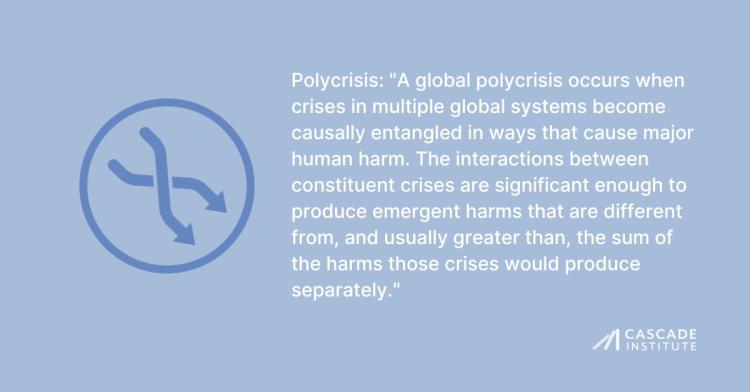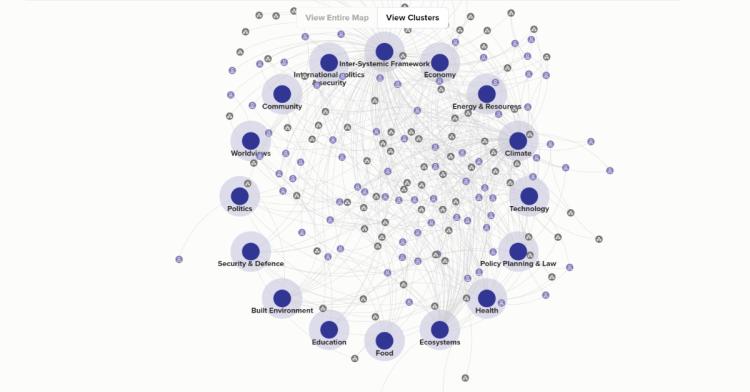Megan Shipman and Michael Lawrence, both Polycrisis Fellows at Royal Roads University's Cascade Institute, are seeking solutions to the myriad interconnected challenges facing humanity.
The term "polycrisis" refers to the inter-relationships among the world's many problems including the environment, technology, economy, geopolitics, and societal challenges.
Shipman and Lawrence are part of a rapidly growing global research community working on global systemic interconnections. Shipman's expertise lies in neuroscience, complex behaviour, and psychology, with a current focus on global health systems and their interactions with other global systems. Lawrence's expertise is in global governance, societal collapse, conflict, and security.
Both are steeped in complexity science as an essential foundation with which to understand global affairs. Their work on the Polycrisis research program is quickly becoming the nucleus of a once-fragmented community of researchers and practitioners dedicated to understanding the polycrisis and turning knowledge into action.

This year, The Cascade Institute's polycrisis program boasts several major achievements in its mission to cultivate crucial knowledge and identify actionable interventions to address the polycrisis.
2024 highlights:
- January: Publication of Global polycrisis: The causal mechanisms of crisis entanglement in the Cambridge journal Global Sustainability. The research paper, a collaboration between the Cascade Institute polycrisis program team and scientists Johan Rockström, Ortwin Renn, and Jonathan F. Donges, develops a theoretical framework with which to investigate crisis interactions. It provides a valuable tool for advancing research and generating actionable insights.
- April: Publication of Introduction to Polycrisis Analysis: the Cascade Institute's Framework for Polycrisis Analysis. The paper introduced an integrated set of concepts that clarifies interactions between global systemic crises and the potential outcomes of those interactions, and is intended to help governments, firms, and communities see through the fog currently surrounding global risks more effectively, so they can better anticipate and respond to emerging threats.
- May: Polycisis in the Anthropocene Conference in Potsdam, Germany convened by the Cascade Institute, the Potsdam Institute for Climate Impact Research, Research Institute for Sustainability - Helmholtz Centre Potsdam, and the Centre for the Study of Existential Risk. The conference assembled leading polycrisis thinkers and practitioners from Brazil, China, India, Kenya, and South Africa, as well as Europe and North America, to examine the present state, key challenges, and future directions of the polycrisis field.
- June: Publication of two papers, one showcasing positive pathways through polycrisis, which "outlines the sorts of systems changes required to avoid, mitigate, and navigate through polycrisis given the dual nature of crises as harmful disasters and opportunities for transformation"; another offering guidance for effectively using causal loop diagrams to elucidate crucial real-world challenges.
- August: The Cascade Institute's publication of the Polycrisis Research and Action Roadmap, informed by the Potsdam conference, and co-authored with the Potsdam Institute for Climate Impact Research, the Research Institute for Sustainability - Helmholtz Centre Potsdam, and the Centre for the Study of Existential Risk. The paper identifies gaps, opportunities, and priorities for the field of polycrisis research and action.
-
September: Polycrisis.org a Cascade Institute-led community hub that features a Resource Library, Learning Journey, Community Map, and Events listing to support polycrisis understanding celebrates its first anniversary.

A depiction of the community map available at polycrisis.org. - October: "Polycrisis in the Anthropocene," a special issue of the journal Global Sustainability, will begin to publish a range of articles on an ongoing basis, that define the leading edge of polycrisis analysis, including such topics as the mechanisms by which global crises spread, historical instances of polycrisis, practical adaptation strategies being pursued today, and possible post-polycrisis futures.
As the polycrisis research community grows, so does the Polycrisis research program.
A current project examines the repercussions of a Trump election. While others have analyzed potential impacts that Trump would have on the U.S. or in particular domains (i.e. the economy, civil rights, etc.), the Cascade Institute researchers are focusing on global consequences as well as complex interactions that might evolve between those global consequences.
Another project is the development of new methods for polycrisis analysis. The team is currently exploring Cross Impact Balance (CIB) as a way to examine potential future scenarios based on the complex way that systems feed back on one another. CIB uses matrix software to examine the interactions of each possible state with every other state. For instance, a model might include potential climate states (1.5 degrees-2 vs 2-3 degrees vs 3 degrees plus) which researchers would analyze against other systems (types of green tech being used, government in place, environmental regulation, food systems) in both what they affect and how they're affected to determine realistic combinations of mutually reinforcing arrangements.
The Cascade Institute's passion for finding solutions in the face of global crises is fueling new innovations and thought leadership at a time when we need them most.











